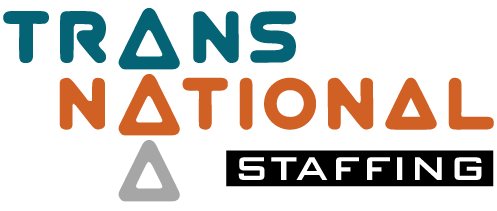
Flexible Scheduling as a Competitive Advantage in Hiring
September 12, 2025
Transnational Staffing and Prudential Alarm Celebrate Industry Excellence at 2025 DMAA Prism Awards
September 20, 2025The landscape of employment law is constantly shifting. For businesses, staying ahead of these changes isn’t just about avoiding penalties; it’s about building a robust and ethical workforce strategy. In 2025, employers face a number of complex compliance challenges, from new rules on independent contractors to evolving wage transparency laws. Navigating this terrain successfully requires diligence, clear processes, and a proactive approach to risk management.
Financial Risks: Penalties for Non-Compliance
Mentioning fines and legal risks makes compliance feel urgent rather than optional. Employers tend to act faster when they see potential costs in black-and-white numbers.
- Misclassification: Misclassifying an employee as an independent contractor can lead to substantial fines from the Department of Labor (DOL) and the IRS. You could be liable for back wages, unpaid overtime, taxes, and other penalties that can range from thousands to tens of thousands of dollars per misclassified worker.
- I-9 Violations: The Department of Homeland Security (DHS) can impose significant penalties for I-9 form violations, which are often based on the number of non-compliant forms. Fines can range from several hundred to over two thousand dollars per violation, and for recurring offenses, they can be even higher.
The Evolving Rules of Engagement: I-9s and Independent Contractors
The distinction between an employee and an independent contractor has never been more critical. The Department of Labor (DOL) continues to scrutinize this relationship, using a “totality of the circumstances” test that focuses on a worker’s economic dependence on a company.
For employers, a misclassification can lead to severe penalties, including back pay, unpaid taxes, and fines. Key areas of focus for the DOL include:
- Behavioral Control: Does the company direct and control the worker’s tasks?
- Financial Control: Does the company dictate how the worker is paid, and are their expenses reimbursed?
- Relationship of the Parties: Is the relationship permanent, and are benefits offered?
Simultaneously, the foundational step of I-9 verification remains a key compliance concern. The process for verifying an employee’s identity and authorization to work in the U.S. has seen recent updates, including new remote verification protocols. Ensuring every I-9 form is completed correctly and stored securely is essential for avoiding audits and fines.
The Rise of Wage Transparency Laws
Wage transparency laws are sweeping across the country, creating new requirements for employers. These regulations vary by state and municipality but generally require companies to:
- Disclose Pay Ranges: Post salary ranges in job descriptions or, in some cases, upon request during the hiring process.
- Prohibit Salary History Inquiries: Bar employers from asking candidates about their past compensation.
These laws are designed to address pay equity, but they also create logistical challenges. Companies must ensure their pay scales are fair, consistent, and well-documented. An unprepared business can face litigation and damage its employer brand.
AI & Automated Hiring: New Rules for a New Era 🤖
AI in hiring is a huge buzz topic right now, and laws are emerging quickly. Addressing it shows we’re future-focused and can help clients avoid “surprise” regulations.
Tools like AI-powered resume scanners and automated interview tools are becoming more common, but they come with a new set of compliance rules. Cities like New York City have already passed laws requiring companies to conduct a “bias audit” on any automated tool used in hiring.
Employers must ensure their AI tools are fair, transparent, and don’t create unintended biases in hiring. The new regulations often require:
- Bias Audits: An independent audit to ensure the tool does not unfairly favor or disadvantage a candidate based on gender, race, or other protected characteristics.
- Transparency: Clear disclosure to candidates that an automated tool is being used to evaluate them.
- Human Oversight: The ability for a human to override the decision of an automated tool.
2025 Compliance Readiness Checklist
People love scannable, actionable lists. A “Your 2025 Compliance Readiness Checklist” section gives HR managers something they can literally print or bookmark. This also makes the blog more shareable across LinkedIn and HR groups.
- Audit All Independent Contractors: Use the latest DOL guidelines to verify your classifications.
- Update Your I-9 Process: Review your I-9 verification and storage procedures to align with current regulations.
- Check Job Descriptions: Update all job postings to include required pay ranges and remove any mention of salary history.
- Train Hiring Managers: Educate your team on new wage transparency and bias laws to avoid violations.
- Review AI Hiring Tools: If you use any automated hiring tools, ensure they are subject to an independent bias audit.
- Centralize Record Keeping: Maintain meticulous, organized, and up-to-date records for all employees and contractors.
Transnational Staffing: Your Compliance Partner
Navigating the complexities of employment law can be a full-time job. Transnational Staffing’s role extends beyond recruitment to help you mitigate compliance risk and stay audit-ready.
- Vetting & Verification: We ensure all candidates placed through our agency have the necessary documentation and are verified in accordance with federal and state regulations.
- Expert Guidance: We stay abreast of the latest legal and regulatory changes, from wage transparency to independent contractor rules, and can advise you on best practices.
- Risk Mitigation: By partnering with us, you can reduce the liability associated with misclassification and improper documentation.
By understanding and proactively addressing the latest compliance challenges, you can protect your business and focus on what you do best: building a successful and thriving organization.
Ready to simplify your staffing process and ensure full compliance in 2025?
Transnational Staffing can provide the talent and peace of mind you need.
📞 Call us at (734) 284-0785 or visit our Contact Us page: transnationalstaffing.com/contact-us
Legal Disclaimer:
This article is for informational purposes only and should not be construed as legal advice. Transnational Staffing is not a law firm and does not provide legal services. Employment laws and regulations vary by jurisdiction and change frequently. Employers should consult with qualified legal counsel to ensure compliance with all applicable laws and regulations.




